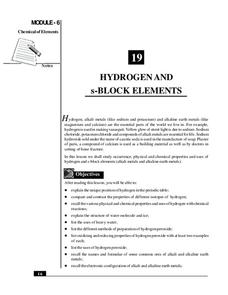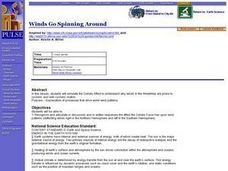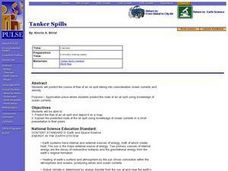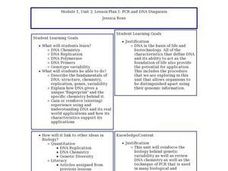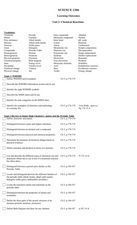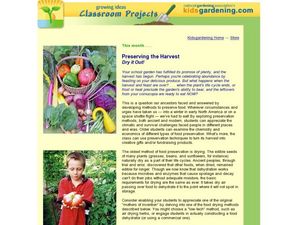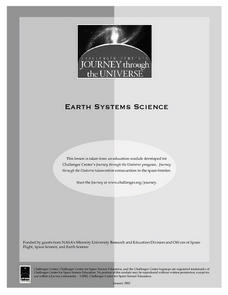University of Pennsylvania
Decoding Propaganda: J’Accuse…! vs. J’Accuse…!
Reading snail mail is a great way to go back into history and to understand others' points of view. The resource, the second in a five-part unit, covers the Dreyfus Affair. Scholars, working in two different groups, read one letter and...
Curated OER
The East Fork Project
Learners identify possible sources of health risks, types of exposures, routes of exposure, and populations that could be affected after discussing water pollution and environmental health hazards. After discussion, students conduct a...
Curated OER
Toxicants and California Blackworms
Students determine the normal behavior of California blackworms. They determine how various concentrations of assigned toxicants affect the worm's behavior. Students are introduced to testing of potential toxicants, an important...
National Institute of Open Schooling
Hydrogen and s-Block Elements
Lesson 19 in the series of 36 analyzes the element hydrogen and the s-block elements. Through readings, answering questions, and discussion, learners write about and explain their occurrence, physical and chemical properties, and...
National Institute of Open Schooling
The Liquid State
Due to surface tension, dew — a liquid, is spherical in shape. Learners explore the properties of liquids in activity seven in this series of 36. Beginning with its basic properties such as boiling point and moving through to surface...
National Institute of Open Schooling
Solutions
Aqua regia, or royal water in Latin, is a solvent that can dissolve solid gold and platinum into a solution. Activity nine in a series of 36 allows classes to learn, through readings and answering questions, what a solution is and the...
Space Awareness
Fizzy Balloons - C02 in School
Carbon dioxide is a very important gas; it is present in the air, used in cooking, and supports plant and animal life. Scholars investigate the properties of carbon dioxide with three different activities. They experience a color change,...
Curated OER
Atoms and Their Interactions
In this atoms worksheet, students will review the characteristics of elements, atoms, and isotopes. Then students will compare the difference between ionic and covalent bonds. Finally, students will balance a chemical equation. This...
Curated OER
Carbon: Structure Matters
Young scholars read the Who We Are Section on Calfee Designs Webpage and discuss carbon usage. They work in pairs to look up the minerals diamond and graphite then create a chart on the properties of each mineral then compare how they...
Curated OER
Water and Diffusion
In this water and diffusion worksheet, learners will explore the characteristics of water and the water molecule. Students will also answer questions about diffusion and the movement of materials due to concentration differences. This...
Curated OER
Winds Go Spinning Around
High schoolers simulate the Coriolis Effect to comprehend why winds in the Westerlies are prone to cyclonic and anti-cyclonic motion. They arrive at an explanation of processes that drive world wind patterns
Curated OER
Tanker Spills
Students predict the flow of an oil spill and depict it on a map. They explain the predicted route of the oil spill using knowledge of ocean currents in a short presentation to their peers.
Curated OER
Milk Makes Me Sick
Students experiment with lactase to find out how milk sugar is broken down in the body. For this enzyme lesson, students use glucose strips to investigate the breakdown of lactose into glucose and galactose for milk digestion in the...
Curated OER
DNA Diagnosis
Students describe the fundamentals of DNA such as structure and replication. Given a picture of a gel, they circle the band that represents the smallest DNA, the largest DNA, and show which DNA sources are the same.
Curated OER
Learning Outcomes
In this science worksheet, students explore the learning outcomes for a unit on chemical reactions. Students define 60 vocabulary words and answer a list of questions for each topic.
Curated OER
Preserving the Harvest: Dry it Out!
Young scholars explore how people preserved their food in the past. In food preservation lesson, students create different models that enable someone to dry out food, such as a food dehydrator. Young scholars also...
Novelinks
Count of Monte Cristo: Concept/Vocabulary Analysis
Explore the complex themes of Alexandre Dumas' The Count of Monte Cristo with a concept and vocabulary analysis lesson plan. Lead your class in a discussion about the underlying social and historical issues surrounding the novel, as...
Curated OER
Colds and Germs
Students determine how diseases are spread from one person to another. They investigate the importance of hand washing to reduce the spread of common colds and other diseases. They listen to teacher read alouds and complete an inquiry...
Curated OER
Diffusion through Membranes
Students identify diffusion and its processes through experimentation and calculations. They also use a CBL and conductivity probe to measure the conductivity of various solutions and study the effect of concentration gradients on the...
Curated OER
What is Earth Science?
This worksheet tests general knowledge of scientific fields with a focus on those involved in earth science. Learners fill in 9 blanks using the provided word bank of scientific fields. In addition, there are 2 questions specifically...
Curated OER
How Does Your (Coral) Garden Grow?
Analyze and graph oxygen isotope ratios in coral samples in relation to the distance from the outer skeleton edge. Compare the data to the mean monthly water temperatures. Uncover whether or not there is any correlation. In addition to...
Curated OER
The Basics of Biochemistry
Science teachers can introduce basic chemical concepts to biology students.
Curated OER
Water Resource Engineering
Learners examine solubility and the significance of water. In this aqueous solution instructional activity students complete a lab activity on soil profiles.
Curated OER
Rust Never Sleeps
Students investigate oxidation-reduction reactions involving iron by conducting an experiment in which they expose iron filings to different atmospheric and ocean conditions. They relate the results to the oxidation banding patterns seen...
Other popular searches
- Biology Chemistry of Life
- Chemistry of Life Unit
- Chemistry of Life Worksheet
- Chemistry of Life Holt
- Chemistry of Life Answers
- The Chemistry of Life
- Nuclear Chemistry Half Life
- Marine Water Chemistry
- Chemistry in Daily Life
- Life Skills Lesson Chemistry



